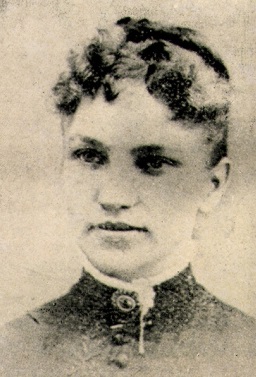The Impact of Boston University in the History of Korean Nursing
When Korean Women began contributing to Korean society in the late twentieth century by playing a part in the development of the Korean economy, they also emerged to make a tremendous impact on nursing in Korea.[1] Three alumni of Boston University School of Nursing, Lee So-wu, Kim Eui-suk, and Kim Suji, were at the center of this momentous shift. These three Korean nursing scholars were educated in the 1970s at Boston University, which started to educate nurses in 1925 and officially founded the School of Nursing in 1946.[2] Even though the School of Nursing closed in 1987, the influence of the Boston University School of Nursing has continued until today in Korea through its alumni.[3]
Interestingly, the very first contribution of Boston University to Korean Nursing can be traced back to the late Joseon Dynasty by an American woman, Annie J. Ellers. She entered the Boston University Medical College in 1884 and arrived in Jemulpo, Korea, as a “Medical student and trained nurse” on July 4th 1886. She was the first female medical missionary to Korea. Her work as a woman for women was notable. At the beginning of her mission work in Korea, she treated female patients and even became Queen Min’s personal physician in 1886 as there were no female doctors to take care of her.[4] In addition, she devoted herself to teaching Koreans. She founded the Chungshin Girl’s School in 1887, which has now grown into the Chungshin Girl’s Middle School and High School.[5] Thirty-five years after Eller’s death in 1938, three Korean women started their education at Boston University and the school continued to influence the Nursing in Korea through the 1970’s.
Lee So-wu
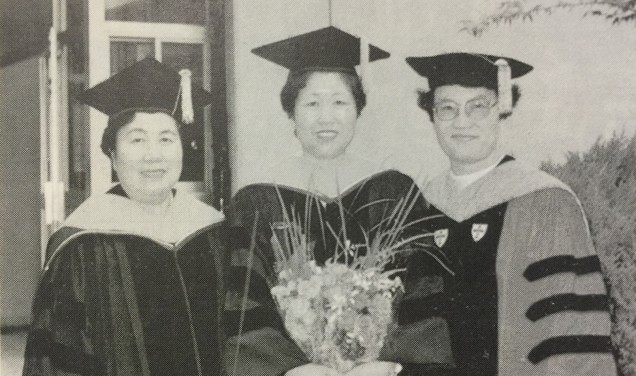
In 1973, Lee So-wu entered the Boston University School of Nursing to pursue a graduate degree. She had already earned her bachelor’s degree in nursing from Seoul National University College of Medicine and had been working as a nurse at Seoul National University Hospital since 1964. After being awarded a Master’s degree from the Boston University School of Nursing, Lee returned to Korea and continued her study at Yonsei University. In 1982, she received the first doctoral degree in nursing conferred by Yonsei University.[6] Later, after she spent 1991 at the University of Washington in Seattle as a postdoctoral researcher, Lee was awarded a Prize for the “Outstanding Thesis of Science and Technology” from the Korean Federation of Science and Technology Societies for the work she did in Washington on how biofeedback can relieve stress symptoms.[7]
Lee So-wu has spent most of her career connected to the academy and has trained students as a Professor of Psychiatric Mental Health Nursing at Seoul National University College of Nursing.[8] Her contribution to Korean nursing has been conspicuous. Lee was a pioneer in the field of hospice care in Korea and her education at Boston University School of Nursing contributed her devotion to hospice care in Korea. When she was taking a course at Boston University School of Nursing, she read a book on hospice that deeply impressed her. Since then, she has had a great interest in hospice care. Therefore, when she came back to Korea after her graduation from Boston University in 1975, Lee began to teach a course called “Dying.”[9] Her interest in hospice led her to begin the first research work that argued for institutionalized hospice care in Korea. Furthermore, she made a great contribution to the field of hospice in Korea by serving both the Korean Hospice and Palliative Nurses Association, and the Korean Society for Hospice and Palliative Care as president.[10]
Lee So-wu was one of the people who helped to establish the College of Nursing at Seoul University. She was convinced of the need to make nursing an independent discipline, so when she was Dean of the Department of Nursing from 1986 to 1990, she worked for the separation of the Department of Nursing from the College of Medicine. Ultimately, Lee was successful. Due to her efforts, and those of her colleagues, Seoul National University decided to separate the Department of Nursing from the College of Medicine. In 1990, which was the last year Lee acted as Dean, the university petitioned the Ministry of Education for the approval of its independence.[11] Two years later, the College of Nursing was established at Seoul National University, the first of its kind among national universities in Korea. Lee served the school as its third president from 1996 to 1998.[12]
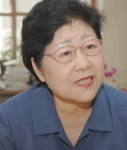
Lee was keenly aware of gender issues in Korea, and she spoke for gender equality — especially regarding female professors’ rights and their employment as professors. Her involvement in gender issues in institutions of higher education enabled her to become the fifth president of the Korean Federation of Women Professors. From that platform, Lee insisted on the need for universities to listen to their female professors’ perspectives on education policy.[13]
Her contribution in the field of nursing in Korea has continued. She served the Korea Health Family Movement as Secretary General. She was the president of the Seoul Nurses Association, the Korean Academic Society of Nursing Education, and the Sigma Theta Tau International Honor Society of Nursing—Korean Chapter. Lee has been the Director of the Korean Nurses, and was a Chief Nurse at Seoul National University.[14] After being made an Emeritus Professor upon her retirement from Seoul National University College of Nursing in 2006, Lee was appointed at Oita University of Nursing and Health Science as a Professor of Nursing and is still teaching students there to this day.[15]
Kim Eui-suk
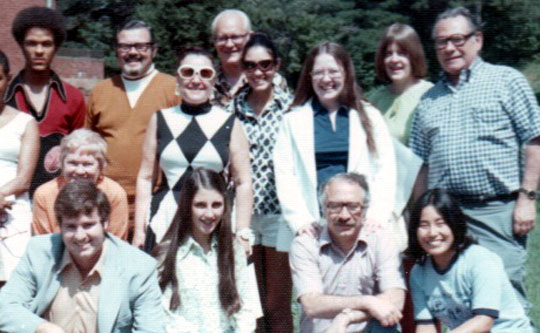
Kim Eui-suk was another influential Korean alumna of the Boston University School of Nursing. She received a Bachelor of Science in Nursing in 1968 and Master’s degree in Public health in 1970 at Yonsei University. She wanted to study in the United States, but she could not afford the tuition to attend an American graduate school. However, in 1972, she was offered aid from the Rockefeller Foundation which enabled her to continue her study in nursing at the Boston University School of Nursing. Between September 1972 and January 1979, Kim received her Master’s degree and Doctor of Nursing Science (DNSc).[16] After her graduation from the doctoral program at Boston University, she taught at the Boston University School of Nursing for a year and then moved back to Korea in 1980 as a Professor of Nursing at Yonsei University.[17]
Not long after she started at the College of Nursing, Kim became an important bridge builder for the school. She established close relationships with schools in the United States for the sake of her school’s academic development and for student exchanges. When she was put in charge of academic affairs for the school, she visited the University of Texas School of Nursing with Dean Sancho Jeon in 1981, and signed a sister school agreement with the school in 1982.
In 1983, only a few years after her return to Yonsei University as a professor from Boston, Kim became the Dean of the College of Nursing at the age of 37. It was a surprise to many people, so newspapers publicized the story. A young woman becoming a dean was rare at that time.[18] Under Kim’s leadership the Yonsei University College of Nursing and the Boston University School of Nursing forged a sister school relationship, not least because Kim was an alumna of both institutions.[19] She also worked as the president of the Nursing Policy Research Institute at the Yonsei University College of Nursing and Yonsei University awarded her the “Excellent Achievement Professor Award” in 1998 for her continuing work for the development of the school.[20]
Her contributions to nursing were not confined to the school, but extended to the wider nursing academy in Korea. When there was no place for nursing scholars in Korea to engage in the Sigma Theta Tau Honor Society of Nursing, which is the honor society of leading scholars in nursing, Kim, the vice president of the Korean Nurses Association at that time, and other executive members including Ha Yeong-su, the president of Korean Academy of Nursing, invited executive members of Sigma Theta Tau in the United States to Korea and offered opportunities to observe the field of Korean nursing. As a result of this effort, Sigma Theta Tau decided to extend their sphere of activity to an international level and established the Sigma Theta Tau International Honor Society of Nursing, which offered space for Korean nursing scholars to join. To provide better circumstances for Korean nursing scholars and nurses, Kim Eui-suk worked with Kim Suji, Oh Ka-sil, and Hong Yeo-shin, all of whom had been involved with Sigma Theta Tau while studying in the United Stated, and together they founded a specific chapter of Sigma Theta Tau International for Korea. Kim Eui-suk became the 2nd president of the Korean Chapter of Sigma Theta Tau International Honor Society of Nursing in 1990 and through it continued her contribution to the academy of Korean nursing.[21]
Her activities in the Korean Nurses Association have been notable. From 1986 to 1988, she was appointed as the President of the Seoul branch of the Korean Nurses Association. In 2002, she boldly declared her candidacy for the 29th president of the Korean Nurses Association. She believed that not only nursing students, but nurses already working needed to be renewed and their skills upgraded. It was not an easy election, for after her term in Seoul had ended in 1988, she did not have much experience in the national association. Nonetheless, she was elected in 2002.[22] Her presidency of the Korean Nurses Association continued until 2005, as she was re-elected to the post.[23]
Furthermore, since the beginning of her professorship in Korea, she has been involved in gender issues for women in Korea, Asia, and the world. Her engagement in the issue was revealed in November 1980 at the National Women’s Convention where she was invited to speak as a panelist.[24] In December 1983, she extended her voice for Asian women at the international workshop for the development of Asian women by offering her opinion, “The reasons for the hindrance of woman’s health are women’s social status in a male dominant context, lack of information and knowledge of their body, and government’s absence on the gender issue.”[25] When the assessment of “10 years of Women” by the United Nations was held in Seoul, Korea, she again raised her voice about gender inequality in Korea and highlighted women’s mental and health problems due to gender discrimination.[26] She sustained her engagement with gender issues as the head of the International Relationship Committee of the Korean National Council of Women.[27]
Kim’s ability and dedication were recognized by the Korean Ministry of Health & Welfare, so she was appointed to be the Consultant of Health Service in November 1988.[28] Moreover, in 1997, she was awarded the “Order of Civil Merit, Camellia Medal” from the Korean government due to her devoted work on population policy and family health.[29]
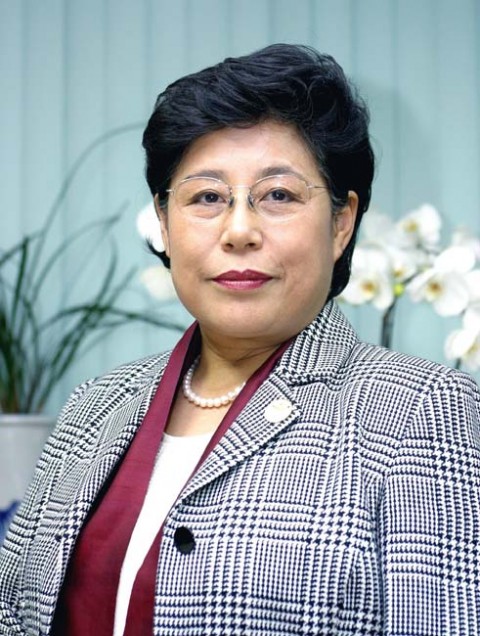
Her contributions were not limited to Korea but even reached organizations throughout the world. In 1994, Kim Eui-suk started to work for the World Health Organization (WHO). When Yonsei University was selected as the secretariat of the WHO, Kim became the general affairs officer of the WHO Collaboration Center for International Nursing and Midwifery Development. She also served the WHO as a Long Term Care Expert Committee member, and was a consultant of the Western Pacific Region (WPRO). Even after her position at the WHO ended, she remains engaged with the WHO. In 2002, for example, she attended the WHO World Health Assembly along with Lee Tae-bok, the minister of the Ministry of Health and Welfare. They were the chosen delegates of the Korean government.[30]
The WHO was not the only international organization that needed Kim Eui-suk. In May 2005, the International Council of Nurses (ICN) nominated her as a director at the twenty-third assembly of the ICN which was held in Taiwan. She was the third Korean director who became a director of ICN.[31]
Kim did not forget her identity as alumna of Boston University and her connection with the school reemerged in 2003. As she was one of the proud Korean alumni of Boston University who was influential in Korean society, she became the president of the Boston University Korean Alumni Association in 2003.[32]
By looking at the fact that she attended the worship service, which celebrated the founding of “Well International”, a Christian NGO organization which offers medical service and education to the poor in Korea and overseas countries, and prayed for the organization in the middle of worship as a Christian at Chungdong First Methodist Church, it seems clear that her Christian faith induced her to be involved not only in nonreligious organizations but also Christian organizations.[33]
Her retirement, in 2008, could not stop Kim from her devotion to organizations that needed her help. One prominent activity since her retirement has been her involvement in the Korea International Cooperation Agency (KOICA). She has given lectures to members of KOICA who were training to go to overseas countries to nurse.[34] Her heart was especially drawn to Bangladesh because it reminded her of Korea in the 1960s, when the country was poor and did not have many nurses to help people. Her experience at Boston motivated her to help build a Graduate School of Nursing in Bangladesh, a school led by KOICA and the Yonsei University College of Nursing. She decided to devote her knowledge and time to the project in Bangladesh. Just as she was funded by the Rockefeller Foundation and educated at the Boston University School of Nursing, she wanted to give what she had received to the people of Bangladesh. She shared her knowledge and resources with those who needed scholarships to go to school, like the opportunities that she had when she was young.[35]
Furthermore, Kim is now speaking out on an important issue in Korea: the problems faced by the elderly. She created a space to talk and work on this issue by founding the Korea Golden Age Forum in 2009.[36] International organizations still look to Ki Eui-suk for assistance even though she has formally retired. The International Planned Parenthood Federation (IPPF) appointed her as director over the Asia Pacific region, and a member of the Awards Committee from 2014 to 2017.[37] She is still actively engaged in these issues and organizations.
Kim Suji
There was another nurse who was accepted to the Boston University School of Nursing in 1975 while Kim Eui-suk was already studying in the doctoral program. Her name was Kim Suji. She had earned her Bachelor and Master’s degree in nursing from Ewha Womans’ University. Unlike Lee So-wu and Kim Eui-suk, Boston was not the first place Kim Suji had studied in the United States. Before her marriage to Kim In-su, who later became a Professor at Korea University, Kim Suji was in a master’s program at Rochester University in 1965. However, a few months later she had to choose whether to continue to study in America or return to Korea to marry Kim In-su. It was hard for her to make a decision but Kim Hwal-lan (Kim Helen), who was the President of Ewha Womans University, advised her to get married. She suggested that Kim Suji may have a chance to study again later. Therefore, she came back to Korea and married Kim In-su in 1966.[38]
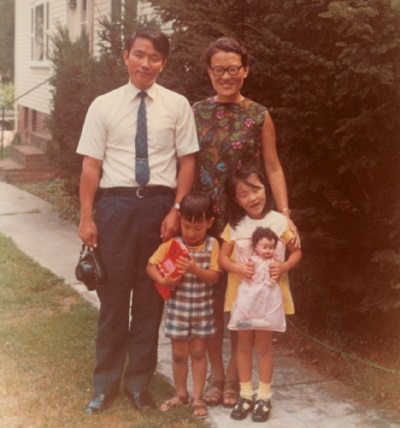
In 1971, her husband was admitted to the University of Hawaii with scholarships. That enabled Kim Suji to move to Hawaii with her family. While there, she worked as a nurse at Maunalani Nursing and Rehabilitation Center, which was where the Former Korean President, Rhee Syngman, stayed and passed away. A few years later, she moved to Indiana where she built her career as a chief nurse in the Bloomington Hospital while her husband worked on his doctorate at Indiana University.[39] Before coming to Boston University, she gained valuable experience as a nurse in both Hawaii and Indiana, which helped her finish her doctoral degree early.
Kim Suji’s opportunity to study at Boston University came in an unexpected way. While she was staying in Indiana with her children, she received a phone call in July 1975 from her husband who had moved to Boston to work as research fellow at Massachusetts Institute of Technology (MIT). He said that she might have a chance to study at the Boston University School of Nursing. She was suspicious about that because the deadline for applications had already passed, and schools had already announced their lists of accepted students. However, she was able to set a meeting with three faculty members of the School of Nursing and was admitted to the school in September.[40] In 1978, she graduated from the Boston University School of Nursing with a Doctor of Nursing Science. She was the first Korean to ever earn such a degree. Her achievement was covered by all of the newspapers in Korea, as it was a very important milestone in Korean nursing.[41]
Her faith as a Christian was a chief motivation in her decision to care for people as a nurse. When she took the Nightingale Pledge at Ewha Womans University with her colleagues, Kim Hwal-lan (Kim Helen) delivered the Congratulatory Address saying, “People who believe in Jesus Christ want to live a life like him. However, it is not an issue whether we want it or not, but practice it or not.”[42] As a Christian who started to go to church when she was 5 years old and who decided to be a nurse to take care of people, she thought herself that “I will also live like Jesus Christ by caring for the poor and needy.”[43] In her career, she always tried to keep in mind that “The successful life for me is living life by caring for people like Jesus did in his life.”[44]
When Kim Suji came back to Korea in 1978, she was offered a job at Yonsei University as a Professor of nursing. In the early years at the university, she laid the groundwork for opening of a doctoral program in nursing—the first of its kind in Korea. She worked with Kim Eui-suk, and established a program that mirrored the curriculum that the Boston University School of Nursing used for its Doctor of Nursing Science.[45] In 1982, Yonsei University produced its first doctoral graduate in nursing. The student was Lee So-wu, and Kim Suji was her advisor.[46]
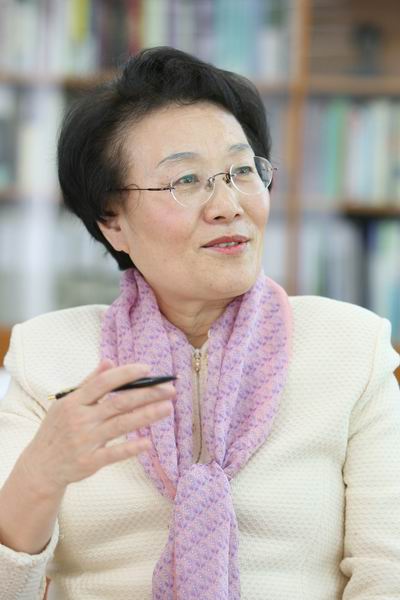
Kim Suji also contributed to the building of other schools. She moved to Ewha Womans’ University, which was her alma mater, to teach as a Professor of Psychiatric Nursing in 1984 and retired in 2006. While she was there, she worked as the Dean of College of Nursing Science for three years. In 2006, she became the President of Seoul Cyber University and worked for the development of the school.[47]
Like the other two alumni of the Boston University School of Nursing, Lee So-wu and Kim Eui-suk, Kim Suji devoted her knowledge and time by serving many core nursing organizations. She was a president of the Korean Society of Nursing Science, the Korea Nurses Christian Fellowship, the Seoul branch of the Korean Nurses Association, Korean Hospice and Palliative Nurses association, the Korean Chapter of Sigma Theta Tau International Honor Society of Nursing, and the Korean Psychiatric & Mental Health Nurse-Specialists. She was vice president of the Korean Nurses Association and the Young Women’s Christian Association (YWCA) in Korea. Kim Suji also acted as the chief director of the Korean Association for Psychosocial Rehabilitation.[48]
The most distinguished achievement of Kim’s career was a project she organized, and which the United Nations Development Programme (UNDP) supported from 1996 to 1998. Kim Suji had first built a community-based mental health nursing center in 1990. Based on its success, she developed a community-based nursing program. It was later called the “Kim Suji Project.” The program was for chronically ill psychiatric patients. The program proved to be very effective, so Kim wanted to expand her efforts. She dreamed of restoring mental health to more patients, so they could live ordinary lives with their families. However, she could not offer the center’s services to many patients as there was not enough financial support to enlarge the program. Therefore, she asked the United Nations Development Programme (UNDP) for support in 1996. UNDP decided to back her program as they believed it would be helpful in rehabilitating mentally ill patients. Her proposal was for $1,000 but UNDP gave her $300,000 for the project. With UNDP’s financial assistance, Kim set up more centers and was able to continue to care for chronically mentally ill patients in Korea.[49]
Kim’s contribution to the field of nursing through the community based mental health program did not go unnoticed. The Florence Nightingale International Foundation (FNIF), which is the premier foundation of the International Council of Nurses (ICN), recognized her achievement and awarded her the International Achievement Award in 2001.[50] Moreover, in 2007, she received the Florence Nightingale Medal from the International Committee of the Red Cross.[51]
Kim Suji was another pioneer of hospice care in Korea. Her first encounter with hospice was when she moved to Hawaii, as there was no hospice care in Korea at the time. When she worked at the Hawaii Straub Hospital in 1973, she attended a lecture called “Death and Dying” which was an unfamiliar topic to her. But the lecture inspired her and she pledged herself to work on hospice care if she went back to her home country.[52] Therefore, when she came back to Korea, she built a hospice center at Ewha Womans’ University and built a nursing home called “Youngpa Silver Home Love House” in 2008.[53]
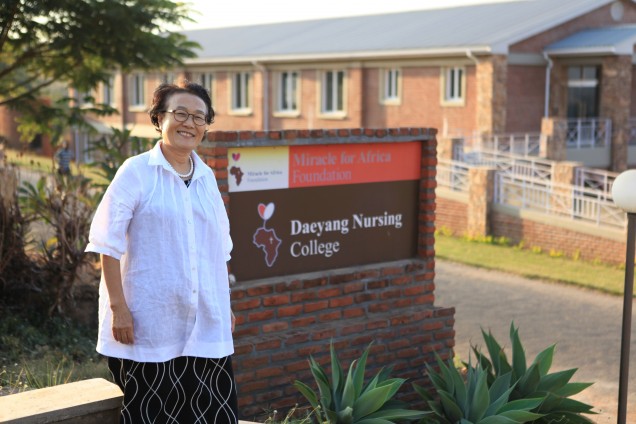
Kim’s commitment to “live a life caring for people like Jesus Christ did,” made her become a sincere nurse and nursing scholar.[54] It also led her to move to Malawi as a missionary in January 2011, where she continues to live. She was asked by Baek Yeong-shim, who was a missionary as well as a nurse at Daeyang Luke Hospital in Malawi for twenty years, to come to Malawi and serve as the President of Daeyang Nursing College. The position of president was vacant, and Baek Yeong-shim was not able to stay in Malawi due to having cancer. It was a sudden request which Kim Suji never anticipated. However, she finally decided to dedicate her life to providing nursing education to the students who wanted to become nurses to save people in Malawi. Therefore, since 2011, she has been working as president of Daeyang Nursing College to produce nurses, and to enhance the health and welfare of the people of Malawi.[55]
Conclusion
It seems like the achievements of Boston University School of Nursing have been forgotten and not many people have paid attention to its contributions to the field of nursing since its closure in 1987. However, the school produced influential alumni who worked for the development of Korean nursing. By receiving an education about hospice through a course at the Boston University School of Nursing, Lee So-wu found her interest in hospice and became a pioneer of hospice care in Korea by teaching about it, which was unfamiliar in Korea at that time. Their experiences of involvement in Sigma Theta Tau Honor Society of Nursing, while studying at Boston University, made these three women leaders in launching the Korean Chapter of the Sigma Theta Tau Honor Society of Nursing, which contributed in widening and developing the academy of Korean nursing. Moreover, Kim Suji and Eui Sook Kim’s work on establishing the doctoral program in nursing at Yonsei University, for the first time in Korea, became a landmark in the history of Korean nursing. It mirrored the curriculum of Boston University School of Nursing and meaningfully its first graduate was Lee So-wu.
These three alumni educated students at the three major universities in Korea, served core nursing organizations in important positions, worked for women by claiming gender equality and teaching girls, and wrote numerous books and articles for Korean nursing. Their individual and collaborative work furthered the development of Korean nursing in a remarkable way. Even though Boston University School of Nursing is now closed, its influence has not ceased and its impact has played an important part in the development of Korean nursing.
[1] Kyung Ae Park, “Women and Development: The Case of South Korea,” Comparative Politics Vol. 25, No. 2 (January, 1993): 131.
[2] “Boston University School of Nursing,” Boston University Howard Gotlieb Archival Research Center, accessed November 16, 2014, http://hgar-srv3.bu.edu/collections/collection?id=115383.
[3] “Boston U. May End School Of Nursing,” The New York Times, May 26, 1987, accessed January 19, 2015, http://www.nytimes.com/1987/05/24/us/boston-u-may-end-school-of-nursing.html.
[4] Sung-Deuk Oak, Sources of Nursing History of Korea Volume I: 1886-1911 (Seoul: Korean Nurses Association, 2001), 33-34.
[6] Kasil Oh et al., “The Historical Trends of Doctoral Nursing Education in Korea,” The Journal of Korean Academic Society of Nursing Education Volume 20 Issue 1 (2014): 97, accessed November 18, 2014, http://koreascience.or.kr/article/ArticleFullRecord.jsp?cn=HGHOBN_2014_v20n1_93.
[7] Korea Federation of Women’s Science and Technology Associations, Woman, Standing at the Center of Science (Yangmoon, 2006), 312.
[8] Hyunjung Kim, “Kim Maeja. Lee Sowoo gyosu toeim gangyeonhoe (The Retirement Lecture of Professor. Mae Ja Kim and Sowoo Lee),” The Korean Nurses Association News, June 22, 2006, accessed January 20, 2014, http://www.nursenews.co.kr/Article/ArticleDetailView.asp?typ=14&articleKey=1441.
[9] Min Seok Lee, “Jeongnyeongyosu Interview Lee Sowoo (Retirement Interview with Sowoo Lee),” Seoul National University News, August 08, 2006, accessed November 23, 2014, http://www.snunews.com/news/articleView.html?idxno=4124.
[10] Sowoo Lee et al., “National Hospice Care Service Development in Korea,” The Korean Nurse 191 (1997): 49-69.
[11] “Seouldae ganhohakgwa ganhodae ro bunri dokrip (The Independence of Seoul National University Department of Nursing as the College of Nursing,” Yonhap News, November 26, 1990, accessed November 23, 2014, http://news.naver.com/main/read.nhn?mode=LSD&mid=sec&sid1=102&oid=001&aid=0003456919.
[12] Hanguk ganho baeknyeon (The Hundred years of Korean Nursing), (Seoul: Korean Nurses Association, 2001), 67; and Seok Chun Kwon, “Seouldae ganhodaehak seolrip (The Establishment of Seoul National University College of Nursing),” The Kyunghyang Shinmun, Februry 02, 1992, 12, accessed November 22, 2014, http://newslibrary.naver.com/viewer/index.nhn?articleId=1992021200329118001&editNo=15&printCount=1&publishDate=1992-02-12&officeId=00032&pageNo=18&printNo=14314&publishType=00010.
[13] Mi Kyung Kim, “Gyoyuk Jeongchaek e yeogyosu moksori damanael teo (I will Apply Female Professors’ Voices in Education Policy),” Daily UNN, April 03, 2009, accessed November 23, 2014, http://www.unn.net/News/detail.asp?nsCode=13849.
[14] Inmul gwangjang (People’s Square), “Sigeuma daeta tau hoejange (In the Position of the President of Sigma Theta Tau Korean Chapter)” The Kyunghyang Shinmun, June 26, 1994, 17, accessed November 13, 2014, http://newslibrary.naver.com/viewer/index.nhn?articleId=1994062600329117022&edtNo=15&printCount=1&publishDate=1994-06-26&officeId=00032&pageNo=17&printNo=15124&publishType=00010.
[15] Hyung Jung Kim, “Ilbon Oitadae Lee Sowoo gyosu (Professor Sowoo Lee, Oita University of Nursing in Japan)” The Korean Nurses Association News, November 09, 2006, accessed November 23, 2014, http://www.nursenews.co.kr/Article/ArticleDetailView.asp?typ=14&articleKey=1504.
[16] Hye Lim Kim, “Wonjobata ssaheun jisik jaesan, je 3guke pul geopnida (I Will Provide My Knowledge and Property, That I Piled Up through the Aid, to Third World Countries),” The Chosun Ilbo, March 16, 2012, accessed November 22, 2014, http://news.chosun.com/site/data/html_dir/2012/03/16/2012031600090.html.
[17] Shin Chul Kang, “Bokjik, sinimdeung gyosu daepok yeongip (Appointments of Reinstated and New Professors),” The Kyunghyang Shinmun, May 12, 1980, accessed November 22, 2014, http://newslibrary.naver.com/viewer/index.nhn?articleId=1980031200329205003&editNo=2&printCount=1&publishDate=1980-03-12&officeId=00032&pageNo=5&printNo=10599&publishType=00020.
[18] Yeoseonggye (Women’s Group), “Kim Eui Sookssi yeondae ganhodaehakjang (Eui Sook Kim, The President of Yonsei University College of Nursing),” The Dong-A Ilbo, May 02, 1983, accessed November 22, 2014, http://newslibrary.naver.com/viewer/index.nhn?articleId=1983030200209207006&editNo=2&printCount=1&publishDate=1983-03-02&officeId=00020&pageNo=7&printNo=18895&publishType=00020; and Yeonsedaehakgyo ganhodaehak 100nyeonsa pyeonchanwiwonhoe (The Compilation Committee of The Hundred Years of Yonsei University College of Nursing), Yeonsedaehakgyo ganhodaehak 100neyonsa (The Hundred Years of Yonsei University College of Nursing) (Seoul: Yonsei University College of Nursing, 2008), 288.
[19] Yeonsedaehakgyo ganhodaehak 100nyeonsa pyeonchanwiwonhoe (The Compilation Committee of The Hundred Years of Yonsei University College of Nursing), Yeonsedaehakgyo ganhodaehak 100neyonsa (The Hundred Years of Yonsei University College of Nursing), 362.
[22] Sang Mi Park, “Sae ganhohyeophoejang e Kim Eui Sook gyosu dangseon (Professor Eui Sook Kim’s Election, the New President of the Korean Nurses Association),” Medical Newspaper, February 19, 2002, accessed November 23, 2014, http://www.bosa.co.kr/umap/sub.asp?news_pk=13574.
[23] Seung Won Choi, “Sae ganhyeop hoejange Kim Eui Sookssi (Eui Sook Kim, The New President of the Korean Nurses Association),” Doctor’s News, February 25, 2002, accessed November 23, 2014, https://doctorsnews.co.kr/news/articleView.html?idxno=7351; Hye Won Jang, “Ganhosadeul i gukmin geongang ui onghoja ro geodeupnaya (Nurses should Reform to be the Supporters of Koreans’ Health),” Sisafocus, July 02, 2003, accessed November 23, 2014, https://www.sisafocus.co.kr:444/news/articleView.html?idxno=600; and Jong Myeon Park, “Interview Kim Eui Sook daehanganhohyeophoejang (Interview: Eui Sook Kim, The President of Korean Nurses Association),” The Korean Nurse, 238 (2005), accessed November 23, 2014, http://webzine.koreanurse.or.kr/Webzine/read_article.php?webzine_id=18&sub_cat_id=191&is_sub_no=343&article_id=563.
[24] Munhwa dansin (Arts in Brief), “ 28il jeongukyeoseongdaehoe (National Women’s Convention on November 28th),” The Dong-A Ilbo, November 21, 1980, accessed November 23, 2014, http://newslibrary.naver.com/viewer/index.nhn?articleId=1980112100209205017&editNo=2&printCount=1&publishDate=1980-11-21&officeId=00020&pageNo=5&printNo=18195&publishType=00020.
[25] Jeong Hee Shin, “Yeoseong baljeon wihan asiajiyeok gukje workshop (Asian Regional International Workshop for the Development of Women),” Mail Business Newspaper, December 08, 1983, accessed November 23, 2014, http://newslibrary.naver.com/viewer/index.nhn?articleId=1983120800099209001&editNo=2&printCount=1&publishDate=1983-12-08&officeId=00009&pageNo=9&printNo=5466&publishType=00020.
[26] Soon Duk Kim, “Yuen yeoseong 10nyeon semina (10 years of United Nations Women Seminar),” The Dong-A Ilbo, May 20, 1985, accessed November 23, 2014, http://newslibrary.naver.com/viewer/index.nhn?articleId=1985052000209207001&editNo=2&printCount=1&publishDate=1985-05-20&officeId=00020&pageNo=7&printNo=19577&publishType=00020.
[27] Editorial Department, “Kim Eui Sook hoejang, yeohyeop gukjegwangyewiwonjang e wichok (The President Eui Sook Kim Appointed to the International Relationship Committee of the Korean National Council of Women),” The Korean Nurses Association, March 20, 2003, accessed November 23, 2014, http://www.nursenews.co.kr/Article/ArticleDetailView.asp?typ=14&page=94&articleKey=618.
[28] Yeonsedaehakgyo ganhodaehak 100nyeonsa pyeonchanwiwonhoe (The Compilation Committee of The Hundred Years of Yonsei University College of Nursing), Yeonsedaehakgyo ganhodaehak 100neyonsa (The Hundred Years of Yonsei University College of Nursing), 485.
[29] Ibid., 386; and “‘Geonganggajeong undong’ gongro dongbaekjang (Healthy Family Movement, Order of Civil Merit, Camellia Medal),” The Munhwa Ilbo, May 15, 2004, accessed November 23, 2014, http://news.naver.com/main/read.nhn?mode=LSD&mid=sec&sid1=102&oid=021&aid=0000069339.
[30] “Ganhyeop Kim Eui Sook hoejang ‘je 55cha WHO chonghoe’ chamseok (Eui Sook Kim’s, The President of Korean Nurses, Presence at the 55th WHO World Health Assembly),” Daily Medi, May 05, 2002, accessed November 23, 2014, http://www.dailymedi.com/news/view.html?no=624264§ion=1.
[31] Yeonsedaehakgyo ganhodaehak 100nyeonsa pyeonchanwiwonhoe (The Compilation Committee of The Hundred Years of Yonsei University College of Nursing), Yeonsedaehakgyo ganhodaehak 100neyonsa (The Hundred Years of Yonsei University College of Nursing), 394; and Tae Hyung Kim, “Kim Eui Sook hoejang, gukjeganhohyeopuihoe isa seonchul (President Eui Sook Kim’s Election as the Director of the International Council of Nurses),” The Korean Nurses Association News, May 30, 2005, accessed November 23, 2014, http://www.nursenews.co.kr/Board/View.asp?page=48&search_KeyField=&search_KeyValue=&number=8226.
[32] Editorial Department, “Kim Eui Sook ganhyeop hoejang Bostondae hangukdongchanghoehjang e (The President of Korean Nurses Association, Eui Sook Kim, became the President of the Boston University Korean Alumni Association),” The Korean Nurses Association News, January 23, 2003, accessed November 23, 2014, http://www.nursenews.co.kr/Article/ArticleDetailView.asp?typ=14&page=135&articleKey=558.
[33] Jihee Lee, “WELL, Uiryobongsa jungsin guho bongyeokhwa (WELL Regularized Medical Centered Aid),” Christian Today, June 14, 2005, accessed November 23, 2014, http://www.christiantoday.co.kr/view.htm?id=148786.
[34] Ae Ran Kang, “Yonseidae·KOICA, Africa Ganho inryeok chocheongyeonsu (Yonsei University and KOICA, Invitation Program for Nurses for Africa),” Daily Medi, November 08, 2014, accessed November 23, 2014, http://dailymedi.com/news/news_print.html?section=1&category=132&no=773579.
[35] Kim, “Wonjobata ssaheun jisik jaesan, je 3guke pul geopnida (I Will Provide My Knowledge and Property, That I Piled Up through the Aid, to Third World Countries),” http://news.chosun.com/site/data/html_dir/2012/03/16/2012031600090.html.
[36] Jinkyu Park, “Kim Il Soon, Lee Sung Nack, Kim Eui Sook… mungchyeoseo mwohana (Il Soon Kim, Sung Nack Lee, and Eui Sook Kim, What are They Doing Together?” Doctor’s News, October 27, 2009, accessed November 23, 2014, http://www.doctorsnews.co.kr/news/articleView.html?idxno=58142.
[37] Kwongu Lee, “Inguhyeophoe Kim Eui Sook isa, IPPF ataejiyeok silhaengisa seonchul (A Director of Planned Parenthood Federation of Korea, Eui Sook Kim, elected as a Director of The International Planned Parenthood Federation),” Yakup Newspaper, July 09, 2014, accessed November 23, 2014, http://www.yakup.com/news/index.html?mode=view&cat=11&nid=175814.
[38] Myeong Eun Seo, “Na ui yuhaksijeol: Ewha yeodae gyosu Kim Suji (My Days of Studying Abroad 05: Professor Suji Kim),” Mail Business Newspaper, January 18, 1985, accessed November 23, 2014, http://newslibrary.naver.com/viewer/index.nhn?articleId=1985011800099209011&editNo=1&printCount=1&publishDate=1985-01-18&officeId=00009&pageNo=9&printNo=5808&publishType=00020.
[39] Kim Suji, Sarang ui dolbom eun gijeok eul mandeunda (Loving Care Makes Miracles), (Seoul: Vision and Leadership, 2010), 109-112.
[40] Hoil Ji, “Kim Suji (13) Bostondae baksagwajung cheot sukje 25jeom bata (Suji Kim (13) Received 25 Points for the First Examination at the Doctoral Program of Boston University),” Kukinews, January 11, 2011, accessed November 23, 2014, http://news.kukinews.com/article/view.asp?page=198&gCode=all&arcid=0004521482&code=23111215.
[41] Yeoseong (Woman), “Ganhohakbaksa Kim Suji gyosu “Ganhowoneun dareunsaram eul sarang hal jul alaya (Doctor of Nursing Science, Professor Suji Kim: Nurses Should love people),” The Dong-A Ilbo, March 18, 1982, accessed, http://newslibrary.naver.com/viewer/index.nhn?articleId=1982031800209211006&editNo=2&printCount=1&publishDate=1982-03-18&officeId=00020&pageNo=11&printNo=18601&publishType=00020.
[44] “Kim Suji Baksa ui Sarang ui dolbom eun gijeok eul mandeunda (Dr. Suji Kim’s Loving Care Makes Miracles),” Christian Global Network Television, February 01, 2011, accessed November 23, 2014, http://w1.cgntv.net/CGN_Player/player.htm?pid=2718&vno=66.
[45] Yeonsedaehakgyo ganhodaehak 100nyeonsa pyeonchanwiwonhoe (The Compilation Committee of The Hundred Years of Yonsei University College of Nursing), Yeonsedaehakgyo ganhodaehak 100neyonsa (The Hundred Years of Yonsei University College of Nursing), 244; and Kasil Oh et al., “The Historical Trends of Doctoral Nursing Education in Korea,” The Journal of Korean Academic Society of Nursing Education Volume 20 Issue 1 (2014): 97, accessed November 18, 2014, http://ocean.kisti.re.kr/downfile/volume/kasne/HGHOBN/2014/v20n1/HGHOBN_2014_v20n1_93.pdf.
[46] Yeonsedaehakgyo ganhodaehak 100nyeonsa pyeonchanwiwonhoe (The Compilation Committee of The Hundred Years of Yonsei University College of Nursing), Yeonsedaehakgyo ganhodaehak 100neyonsa (The Hundred Years of Yonsei University College of Nursing), 512.
[47] “Seoul Cyberdae chongjang e Kim Suji gyosu seonim (Dr. Suji Kim became The President of Seoul Cyber University),” Digitaltimes, April 21, 2006, accessed November 24, 2014, http://news.naver.com/main/read.nhn?mode=LSD&mid=sec&sid1=105&oid=029&aid=0000135173.
[48] “Seoul Cyberdae Kim Suji chongjang (The President of Seoul Cyber University),” Newswire, January 11, 2007, accessed November 23, 2014, http://www.newswire.co.kr/newsRead.php?no=218479.
[50] “The International Achievement Award,” Florence Nightingale International Foundation, accessed November 23, 2014, http://www.fnif.org/awards.htm.
[51] “Florence Nightingale gijang hangukin susangja 3myeong seonjung (Three Koreans were Selected for the Florence Nightingale Medal),” The Chosun Ilbo, May 15, 2007, accessed November 23, 2014, http://www.chosun.com/site/data/html_dir/2007/05/16/2007051600018.html.
[53] So Jung Park, “Sanghan galdae ege huimangeul (Hope for the Broken Reed),” Godpia News, November 17, 2006, accessed November 23, 2014, http://news.godpia.com/sub_con.asp?db_idx=11953&division=A006;and Hoil Ji, “Kim Suji 62se e dasi bokjihak dojeon (Suji Kim (20), Challenger for Social Welfare at the Age of 62),” Kukinews, January 20, 2011, accessed November 23, 2014, http://news.kukinews.com/article/view.asp?page=1&gCode=kmi&arcid=0004555605&cp=nv.
[54] Tae Hyung Lee, “Kim Suji Seoul Cyberdae chongjang, dasi taeeo nado ganhosa doel geot (Suji Kim, The President of Seoul Cyber University, I Would Be a Nurse if I Were Born Again),” The Kukmin Ilbo, February 02, 2010, accessed December 11, 2014, http://m.missionlife.co.kr/view.asp?gCode=0001&sCode=all&arcid=0003364123&code=23111111.
[55] Hana Lee, “Euntoe hu Malawi eseo uiryo bongsa haneun Kim Suji hakjang (President Suji Kim, who Volunteered for the Medical Service, after Her Retirement, in Malawi),” Women’s News, Feburary 17, 2012, accessed December 19, 2014, http://www.womennews.co.kr/news/52507#.VRCCHyuG_CD.
Written by: Younghwa Kim
Edited by: Daryl Ireland
